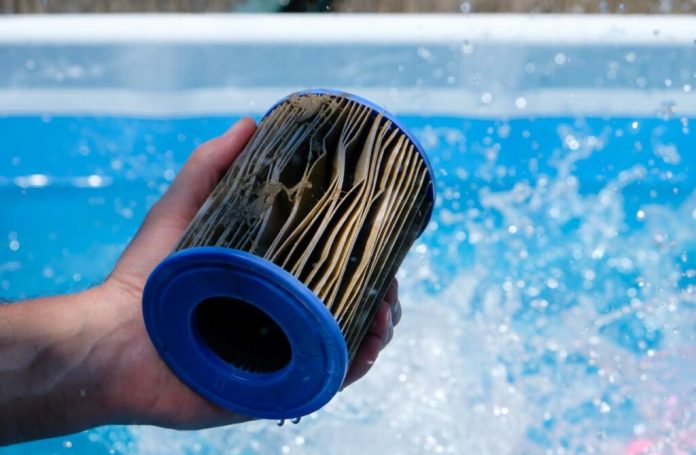Maintaining a clean and safe swimming pool requires regular attention, particularly when it comes to the pool filter. A properly functioning filter ensures your water remains crystal clear and free of debris, dirt, and algae. But how often should you change your pool filter? This guide will explore the key factors that influence the longevity of your filter and provide essential tips for optimal Pool Filter Maintenance, Commercial Pool Water Chemistry.
1. Understanding Your Pool Filter System
Before determining when to change your pool filter, it’s important to understand the type of filter you have. There are three common types of pool filters:
- Sand Filters: These use specially graded sand to trap debris and contaminants. They typically need to be replaced every 5-7 years but require backwashing (reversing the water flow) regularly to clear out accumulated debris.
- Cartridge Filters: Made from a pleated polyester material, these filters trap smaller particles. They last between 2-4 years, depending on the pool’s usage and the level of maintenance.
- Diatomaceous Earth (DE) Filters: These use a fine powder made from fossilized diatoms to filter even the smallest particles. DE filters generally need to be cleaned every 6-12 months, with a complete replacement of the powder annually.
Each filter type has a different lifespan, but regular maintenance can help extend their longevity and ensure your pool remains in pristine condition.
2. Factors Affecting Pool Filter Lifespan
Several factors influence how often you need to change your pool filter. These include:
- Pool Usage: Heavily used pools accumulate more debris, oils, and bacteria, requiring more frequent filter cleaning or replacement.
- Water Chemistry: Imbalanced water chemistry can cause damage to your filter. Keeping your pH, alkalinity, and chlorine levels in check ensures that the filter isn’t overworked or clogged with calcium deposits.
- Location and Environment: Pools near trees or in windy areas may collect more debris, leading to faster filter clogging. Pools in dusty or urban areas may also require more frequent filter maintenance.
- Commercial Pools: For commercial pools with higher bather loads and more stringent health regulations, maintaining clean water is even more critical. Regular filter checks and water chemistry tests should be done more frequently than for residential pools.
3. Signs It’s Time to Change Your Pool Filter
While the lifespan of a filter can vary, certain signs indicate that it’s time for a replacement:
- Poor Water Circulation: If you notice reduced water flow from your pool jets, your filter may be clogged, and the system could be struggling to circulate water effectively.
- Cloudy Water: One of the first signs of a malfunctioning filter is murky or cloudy water. This is often due to a dirty or damaged filter unable to trap debris properly.
- Increased Pressure Readings: Filters operate within a specific pressure range. If the pressure gauge on your pool system shows consistently high readings, this indicates that the filter is dirty and may need cleaning or replacement.
- Frequent Backwashing or Cleaning: If you find yourself needing to backwash or clean your filter more frequently than usual, it might be a sign that the filter material is worn out and should be replaced.
4. Pool Filter Maintenance Best Practices
Regular pool filter maintenance is key to ensuring its longevity and your pool’s overall health. Here are some tips to keep your filter in top shape:
- Regular Cleaning: Depending on the type of filter you have, clean or backwash it according to the manufacturer’s recommendations. For cartridge filters, remove and rinse them every 1-3 months. Sand and DE filters should be backwashed when the pressure gauge indicates a need.
- Monitor Water Chemistry: Maintaining proper pool water chemistry is essential for filter performance. Imbalanced water can cause scaling, corrosion, or clogging, which can reduce the filter’s effectiveness and shorten its lifespan.
- Routine Inspections: Periodically inspect the filter for signs of wear or damage, such as tears in the filter material, worn-out O-rings, or leaks in the housing. Address any issues promptly to avoid bigger problems.
- Seasonal Maintenance: For commercial pools or those used year-round, seasonal checks should include thorough filter cleaning, water chemistry tests, and equipment inspections to ensure everything runs smoothly.
5. Commercial Pool Water Chemistry: A Special Focus
For commercial pools, the need for stringent filter maintenance and careful monitoring of water chemistry cannot be overstated. In commercial settings, high bather loads and a higher turnover of water increase the likelihood of debris and contaminants entering the pool system. Maintaining clean water is not just about aesthetics—it’s essential for health and safety.
To avoid potential health hazards, commercial pool operators should:
- Test Water Frequently: Conduct regular tests for pH levels, chlorine, alkalinity, and calcium hardness to prevent imbalances that can strain the pool filter.
- Maintain Proper Sanitizer Levels: Chlorine or alternative sanitizers should be kept at appropriate levels to eliminate harmful microorganisms without overwhelming the filter.
- Upgrade Filter Systems: Commercial pools may benefit from larger or more advanced filtration systems, such as DE filters, which are more efficient at handling heavy loads of contaminants.
6. When to Replace Your Pool Filter
The general guideline for changing your pool filter is:
- Sand Filters: Every 5-7 years
- Cartridge Filters: Every 2-4 years
- DE Filters: Replace the DE powder annually, and the filter grids every 10 years
However, if your filter shows signs of wear, reduced efficiency, or an inability to maintain clear water despite regular cleaning, it’s time to replace it sooner.
Conclusion
Proper pool filter maintenance is essential for ensuring your pool remains clean, safe, and inviting. While the specific timeline for changing your pool filter will depend on factors like pool usage, environment, and the type of filter, staying vigilant for signs of filter degradation will help you maintain a well-functioning system. For commercial pools, in particular, water chemistry and filter maintenance should be top priorities to meet health standards and provide a pleasant experience for all users. By following best practices and keeping an eye on your filter’s performance, you can enjoy a pristine pool year-round.






















